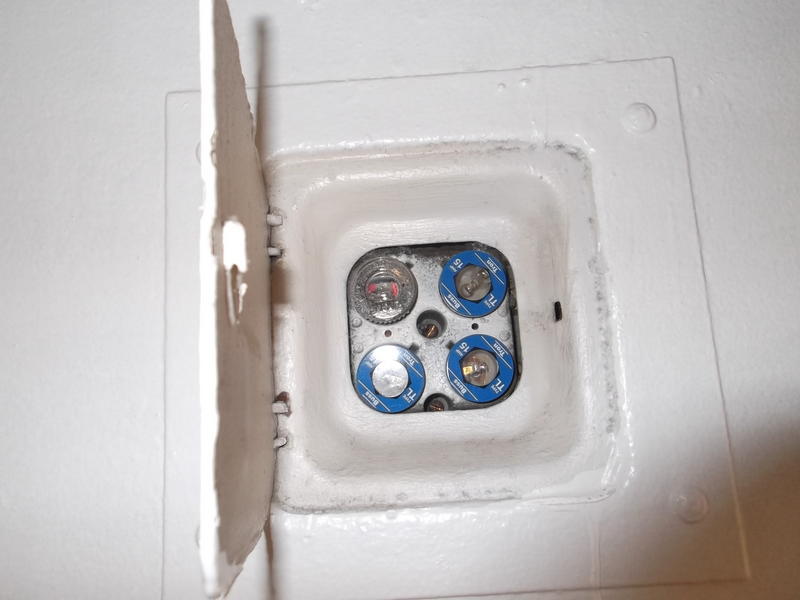I inspected a triplex today built in 1948, first time I have come across the old glass fuse boxes. I am curious as to how some of you would write it up, as obsolete? What do you look for when inspecting these? Any help would be appreciated, Thanks!
and by the layers of paint on the screws, it has not been opened in years…
I don’t write then up as obsolete. I just put in there all the things wrong with it and suggest they call out a electrician. If everything looks good I suggest evaluation based on the lack of a grounding system or that breakers are better choice. You can always suggest upgrade to breakers as a possible safety upgrade.
Breakers have a larger trip curve than a fuse. In other words a fuse will blow a lot faster than a breaker will trip.
As a general rule a breaker will let 135% the rating on the handle pass for up to two hours and the glass fuse will blow in just a few seconds with that amount of current.
A breaker will let six times the rating on its handle pass for two full seconds but the Edison base fuse would never let that amount of current flow through it before it melted.
Which is safer?
Wouldn’t the blue type TL time delay fuses in the photo get close to the trip curve of a circuit breaker?
Mary,
since no one has answered your question yet, i will take a stab at it.
The main issue with most older auxillary fuse panels (or panels in general) is the lack of ground/neutral seperation, which is currently a requirement.
If the panel is really old then no grounds will be present at all on the wiring, which is another safety concern in itself. Without grounding conductors then these panels cannot be upgraded or changed unless new wiring is added.
I would just inform them of the lack of modern grounding and considerations should be made to retrofit or replace the panel so it is safe and compliant.
As long as the panel and other circuits are all still in an original state, then you cant say it has to be changed. You can recomend upgrade for safety reasons, but in theory it is still acceptable.
Most of the time this isnt the case and some clown has been in the panels making a mess of things, so after that its fair game. .
Very good Sean!
This kind of thing is not about “what it is”, rather “how it operates”.
Report it and let the client decide.
We don’t know how the client is going to utilize the property in comparison to how the property is being utilized today at the time of inspection.
Recommending further evaluation by an electrician without a reportable obvious defect is just “home inspector cover your butt”!
We are not required to evaluate and we are not required to recommend further evaluation just because it’s original equipment. It’s just a scape goat to recommend someone else do your job.
I always find it rather ludicrous to inspect a 100±year-old home and compare it with new construction. It should be pretty obvious to the client that their 100-year-old farmhouse is not new construction.
It is what it is.
In most cases there is no ground fault circuit interrupter protection, no arc fault circuit interrupter protection, no ground rod below the meter, two prong wall outlet receptacles etc.
Do we recommend these upgrades as well?
In most licensed state requirements, you must describe the electrical service. All of these issues would be covered in the first paragraph of that report section.
Here is one of my saved narratives (source unknown)
FUSE PANELS ARE GENERALLY SEEN AS BEING MORE RELIABLE THAN BREAKER PANELS DUE TO THE FACT THAT THEY WILL ALWAYS TRIP WHEN OVERLOADED BY EITHER LOADS IMPOSED ON THEM OR UNDER DEAD SHORT CONDITIONS. BREAKERS ON THE OTHER HAND HAVE BEEN KNOWN NOT TO TRIP AT THE SPECIFIED AMPERAGES.
MANY INSURANCE COMPANIES HOWEVER WILL EITHER NOT INSURE, OR INSURE AT A HIGHER PREMIUM HOMES THAT STILL HAVE FUSE PANELS. THIS IS NOT DUE TO ANY DANGER FROM THE FUSES THEMSELVES, RATHER IT IS INDICATIVE OF A GENERALLY OLDER UNIMPROVED SYSTEM WHICH STATISTICALLY WILL PRODUCE MORE ELECTRICAL FIRES.
Thanks Sean, great explanation.
Thanks Bob, I am adding the second narrative to my report. I appreciate the help with this.
I have a friend who bought an old drill press that has a one horse power 120 volt motor. He plugged it in a receptacle in his old shop that has a fuse panel and it blew the 20 amp type S fuse. Now he has a drill press that he can’t use to drill large holes in thick metal. I installed a four circuit breaker panel and fed it from the 60 amp cartridge fuses in that old fuse panel and installed a receptacle on a 20 amp breaker. The breaker has not tripped in three years or should I say he hasn’t complained about it if it has.
On a side note he was repairing my manure spreader when the fuse blew. We traded work so while he worked my equipment I worked on his. When it was all over he could drill holes and I could spread sh** well I think you know what I can spread. LOL
